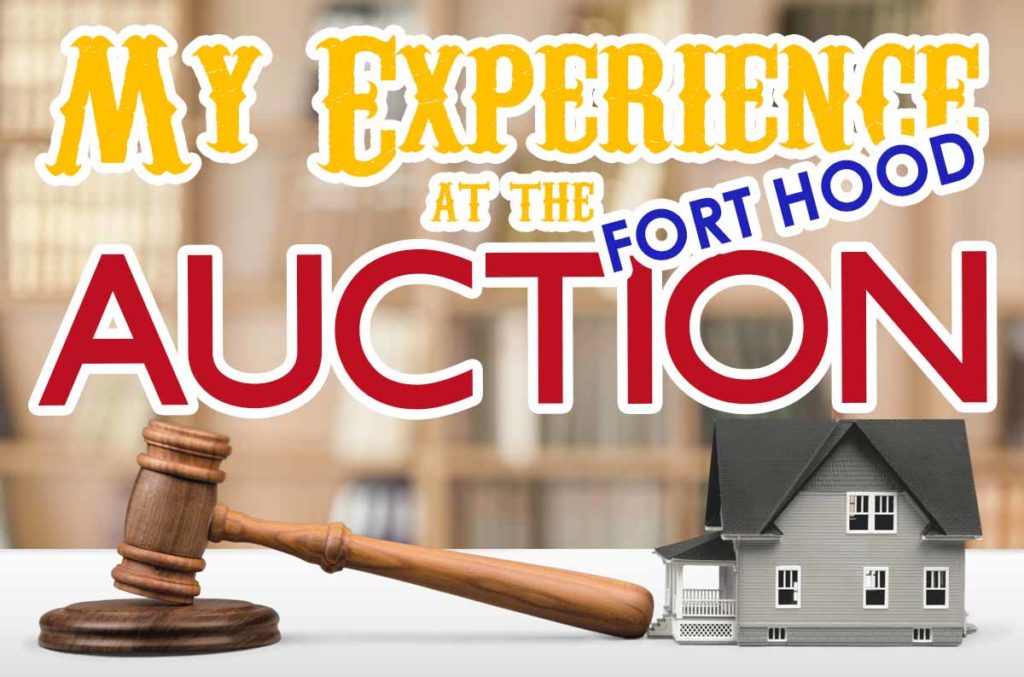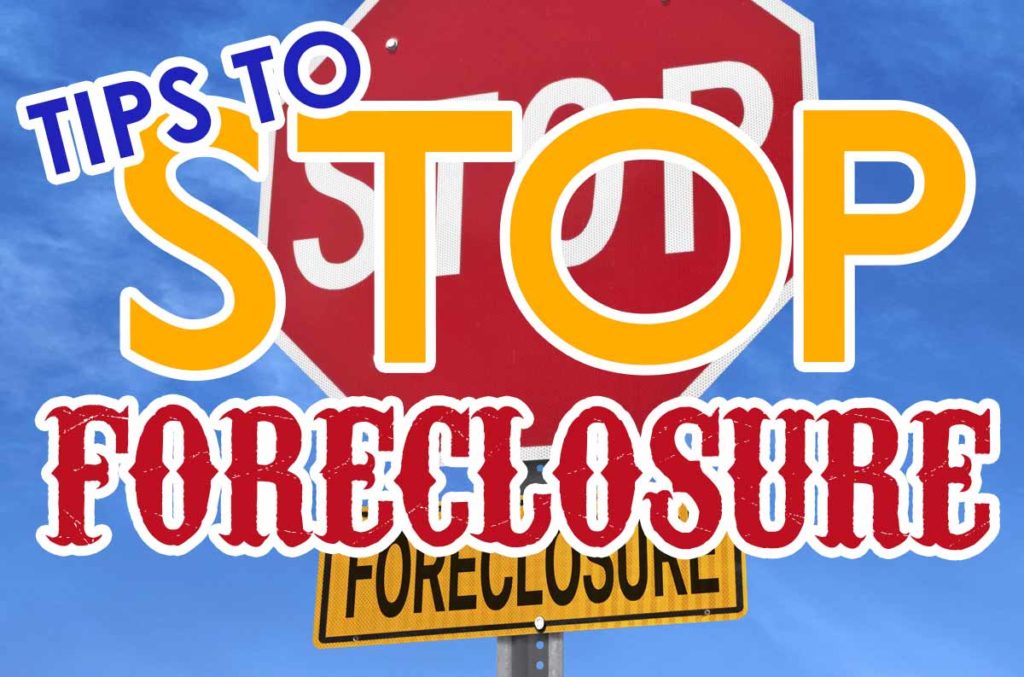
Takeaways
- Go and view the auction once, before you go to try to buy
- The auction is one of the best places to meet serious, local investors
- The auction is not likely going to be your only source for investment properties
 When, What, and Where
When, What, and Where
The properties being auctioned are listed online at least 21 days out from the auction – some even a couple months out. They accessible for free, however it is not in a very user friendly format. Some properties are only listed by legal description, and not address.
All of the investors who attend the auction regularly use this same website for a printout of upcoming foreclosures, for $40/mo. You want to go to Order a Product > Product #1- PRE-FORECLOSURE LIST (Residential & Commercial), and select the counties you are interested in (presumably at least Bell County for Killeen, Harker Heights, Temple and Belton).
This printout, unlike the free, public county records, also includes an estimate of the lien amount / auction price. This is an estimate, however, and is generally $10,000 or so off in one direction or another, in my experience. Still, it is useful when trying to narrow down which properties to focus your due diligence on. There is no way beforehand to learn what the actual bank minimums for each property will be.
The auction is the first Tuesday of every month. Below is the info for both Bell County and Coryell County. I have only been to the Bell County auction, however, and the information in this article is about Bell County specifically.
Bell County Auction
(Killeen, Harker Heights, Belton, Temple)
Bell County Justice Center
1201 Huey Dr, Belton, TX 76513
1st Tuesday every month, located outdoors near the main entrance
Coryell County Auction
(Copperas Cove, Gatesville)
Coryell County Courthouse
620 E Main St B, Gatesville, TX 76528
1st Tuesday every month, located outdoors on north door of the courthouse
What Happens
Most folks start showing up at 9:30 AM. Auction.com is usually set up or setting up by then. The other trustees often don’t show up until 10 AM or even later – sometimes 11 AM and beyond. Investors arrive around the same time. If you are at the auction to network, do it during this time before 10 AM, or wait until afterwards when an investor is clearly available and not paying attention to the auction. Generally there are perhaps 40-50 people present for the auction, however only a small fraction are actual investor-bidders.
The Trustees
The trustees are those entrusted with conducting the sale process by the lawyers. There are multiple trustees every day – my understanding is it depends on the law firm handling the foreclosure. The trustees have no relation to each other, and will often be auctioning properties at the same time.
Except for Auction.com, most trustees show up, set up a table, and just start reading property information – whether or not anyone is listening. You have to be paying attention during this time. For that reason, this is probably not a good time to try to be sociable with the actual investors and bidders who are trying to pay attention to when their property shows up.
The trustees will read information about a property – sometimes without the actual street address but rather by the owner’s last name, so be prepared. The trustee will read the minimum bid, which is usually the first time anyone is aware of what that number will be. Anyone who wants to bid has 15 or 30 seconds to say so before the trustee announced that the bank has bought the property for their minimum. You do not have to sign in with the trustees beforehand. You just make your bid. Once you win, the trustee asks your name and you go on to the next step: paying for the property.
Most properties are not picked up by investors – the vast majority in fact. The bank minimums are too high on about 80-90% of these properties and the bank purchases them.
Auction.com
Auction.com has their own booth at the auction. They have a list of properties online that are being sold at the auction, but that list is not always exhaustive. You do need to sign in at their booth upon arrival and they will give you a number you can use to bid on their properties. In my observations, they seem to not have as many good deals versus the other trustees.
Auction.com also starts with a ridiculously low “starting offer”. This is just a trick to get people to bid and presumably get excited about the home. They then start bidding against themselves until they get to the actual bank minimum. Experienced investors wait until the auctioneer has gotten to the actual bank minimum before making a bid. If you bid before Auction.com gets to the actual bank minimum, you just announced to everyone that you’re a newbie. The other trustees thankfully don’t do this, skipping the show and getting straight to business.
The Investors
Who is your competition? There are local real estate brokers who also pick up rental investments for themselves from the auction, as well as Homevestor franchise owners (i.e. We Buy Ugly Houses). There are even some investors who fly in from states like California just for the Bell County auction. Sometimes these investors will have proxies present on their behalf, making bids. These folks are usually on the phone during the bidding.
These investors are also experienced with the auctions and local real estate, and sometimes work on thin margins. Be careful should you get into a bidding war with them if you are newer. At the same time, if you find yourself bidding on the same property that they are (like I did), you probably did your homework right and picked a good one! Good luck!

Flipping in the Fort Hood Area
- Flipping can be done in Killeen
- But the MLS is probably not the lead source
- Most flips are bought with target ARVs around $90,000-$160,000
Bell County Expectations
In my experience, there are usually 4-6 serious investors who pick up 5-10 properties between them at any given auction. Any given auction there may only be 2vor 3 times when investors actually bid against each other. On most bids, if it is just one investor bidding, they will say “one dollar over”, and pick up the property for the bank minimum bid plus one dollar.
Once an investor wins the offer, they immediately go to the desk of the trustee and start signing documents and producing checks. I have never seen an investor who won a bid without money on hand and I don’t know what happens in that case, other than it can’t be good.
Investors don’t get keys or any ceremony. Just a recorded deed. The property is now yours, and yours to figure out what to do with it.
No Magic Bullet
Do not go to the auction thinking that all the properties are at a huge discount and, as long as you have some cash, you can pick up a property at a guaranteed awesome price.
Most properties at the auction are close to or even over their actual ARV (after-repair-value). Those that are deals are better margins than one can expect buying foreclosures from the MLS, but not dramatically better. You still need to know what you’re doing.
The best deals are probably going to have multiple bids, won by whoever has the slimmest profit margin they can work with.
Tax Auction
Generally every three months, the tax auction is going on at the same time as the foreclosure auction. This is a very hectic time as about 30+ additional people show up just for the tax auction. Those properties are read off by the sheriff with a bull horn – again, all while the foreclosure auction trustees are quietly reading their properties for auction.
Tax liens are a different subject that I have not dealt with and won’t go into detail here. Don’t get confused if you show up on the same day as a tax lien auction.
What you Need to Make an Offer
You will need an ID. You will need to have cashiers checks on hand. We brought about 20 checks in denominations of $20,000, $10,000, $5000, $1000, and $500.
You do not have to have the exact amount, and I suppose could theoretically bring just one really big check for your max budget (unless you plan on bidding on multiple properties). You will get refunded the difference in what you pay versus the actual price – e.g. if you have $60,000 in checks for an accepted bid of $59,700, you’ll get $300 back, but possibly not until weeks after.
My Home is on the Auction List!
If your home is on the auction list, it is very late in the foreclosure process and there is very little time. You do still own your home, up to the point that it is auctioned off. The auction is the end of the road of foreclosure. After the auction, it is too late and there are only some specific and extremely rare methods of getting your home back. If you are still in the home, you will be asked to move or else evicted.
Your options are probably to speak with your lender right away and attempt a solution like a refinance. Another option is to reach out to an investor at the last minute to sell the home but save your credit.
Stop Foreclosure
- Start working on a solution before you are late on your payments
- Talk to a Realtor and your lender if you are concerned about making your mortgage payment
- There are resources to help you keep your home – use them!
Caution!
For auction buyers, your purchase is not reversible. You are stuck with this property and all its faults. That might not just include needed repairs, but title issues as well. Do your due diligence beforehand. This is not a strategy recommended for someone who is spending money they can’t lose.
Do as much due diligence beforehand as possible. Look through the foreclosure list and narrow it down to the ones that you think will have potential and are interested in. Drive by those properties to look for issues or information that doesn’t reflect on the information available. If you have a title company you are very close with, they may do free title searches on a couple of your top choices to make sure you aren’t inheriting any title issues.
Remember that, before the auction, the current owner is still the owner of the home, and has all the rights to their home. The bank does not own anything yet. You cannot trespass, just like you can’t on anyone else’s home. The bank can’t negotiate with you. Only the current owner.
After the Auction
If the properties you had your eyes on went back to the bank, they are likely going to come on the market within the next 3-6 months as a foreclosure. Some properties go to aution.com first. If the bank minimum was too high on these properties, fear not! Often their foreclosure asking price is less than what they were selling for at the auction. The bank is trying to get the full loan amount at the auction. Afterwards, they can take a loss on a fraction of the loan and list it for less just to get it sold.
My Personal Auction Experience
I personally have bid only once at the auction – unsuccessfully. I had $60,000, and had identified a property in NE Killeen (76543) that I thought was worth about $80,000 fixed up, and would rent for $850-$900/mo. I decided my max budget beforehand for this property was $40,000.
At the auction, I was ecstatic to learn the minimum bid was going to be $33,000. Once the trustee got to that property, I started with one dollar over. The wife of a Temple real estate broker/investor, however, also had it in her sights. We bid back and forth until I got the $39,000. She bid $40,000, and I stuck to my guns and didn’t go over.
It was pretty intense for me and my first time!
We found an off market property shortly thereafter and put our resources into it instead of the auction.
Conclusion
At only 5-10 properties sold in a given month, the auction. And there is competition. Do not count on the auction to be your primary lead source if you are investing. I recommend exploring things like direct mail.
But the auction can absolutely be a worthwhile source of business if you have cash, suited to all investing strategies (flipping, “whole-tailing”, buy and holding, and BRRRRing). I highly recommend keeping tabs on it and attending when looking for properties in the Fort Hood area. And at a minimum, it is a superb place to network with local investors, see what they are doing, and perhaps even getting a job with them if you are newer and trying to learn the ropes.

